EVGA X79 Dark Review
by Ian Cutress on October 23, 2013 10:00 AM EST- Posted in
- Motherboards
- Intel
- EVGA
- X79
Rightmark Audio Analyzer 6.2.5
In part due to reader requests, we are pleased to include Rightmark Audio Analyzer results in our benchmark suite. The premise behind Rightmark:AA is to test the input and output of the audio system to determine noise levels, range, harmonic distortion, stereo crosstalk and so forth. Rightmark:AA should indicate how well the sound system is built and isolated from electrical interference (either internally or externally). For this test we connect the Line Out to the Line In using a short six inch 3.5mm to 3.5mm high-quality jack, turn the OS speaker volume to 100%, and run the Rightmark default test suite at 192 kHz, 24-bit. The OS is tuned to 192 kHz/24-bit input and output, and the Line-In volume is adjusted until we have the best RMAA value in the mini-pretest. We look specifically at the Dynamic Range of the audio codec used on board, as well as the Total Harmonic Distortion + Noise.
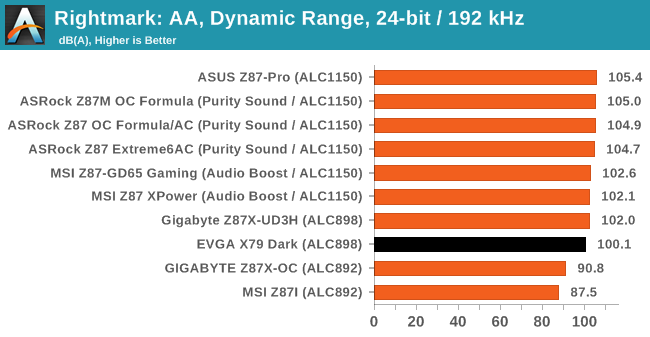
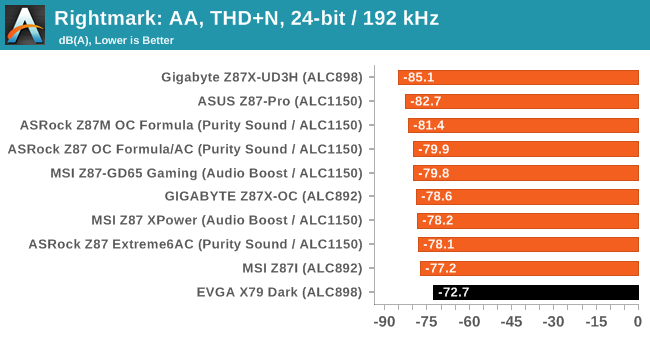
Using the Realtek ALC898 we see a dynamic range of over 100 dBA, although GIGABYTE squeezed more out of the codec than EVGA in terms of harmonic distortion levels.
USB Backup
For this benchmark, we run CrystalDiskMark to determine the ideal sequential read and write speeds for the USB port using our 240 GB OCZ Vertex3 SSD with a SATA 6 Gbps to USB 3.0 converter. Then we transfer a set size of files from the SSD to the USB drive using DiskBench, which monitors the time taken to transfer. The files transferred are a 1.52 GB set of 2867 files across 320 folders – 95% of these files are small typical website files, and the rest (90% of the size) are the videos used in the WinRAR test. In an update to pre-Z87 testing, we also run MaxCPU to load up one of the threads during the test which improves general performance up to 15% by causing all the internal pathways to run at full speed.
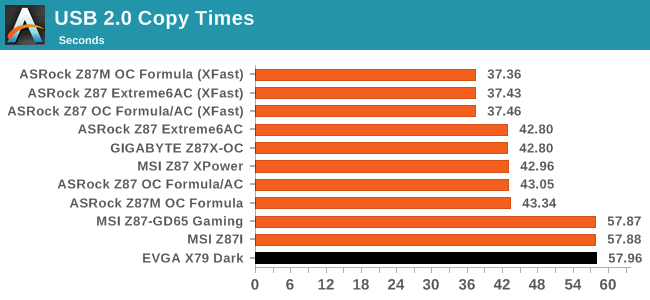
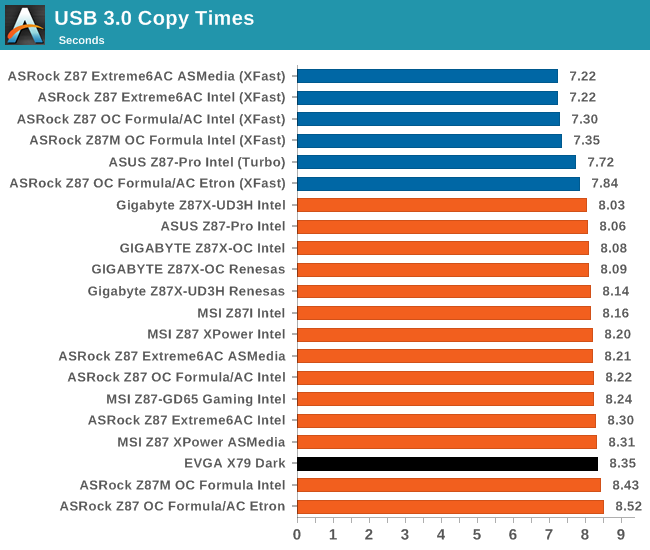
The EVGA X79 Dark, being on the older chipset, cannot keep up pace with the newer chipsets and optimizations.
DPC Latency
Deferred Procedure Call latency is a way in which Windows handles interrupt servicing. In order to wait for a processor to acknowledge the request, the system will queue all interrupt requests by priority. Critical interrupts will be handled as soon as possible, whereas lesser priority requests, such as audio, will be further down the line. So if the audio device requires data, it will have to wait until the request is processed before the buffer is filled. If the device drivers of higher priority components in a system are poorly implemented, this can cause delays in request scheduling and process time, resulting in an empty audio buffer – this leads to characteristic audible pauses, pops and clicks. Having a bigger buffer and correctly implemented system drivers obviously helps in this regard. The DPC latency checker measures how much time is processing DPCs from driver invocation – the lower the value will result in better audio transfer at smaller buffer sizes. Results are measured in microseconds and taken as the peak latency while cycling through a series of short HD videos - under 500 microseconds usually gets the green light, but the lower the better.
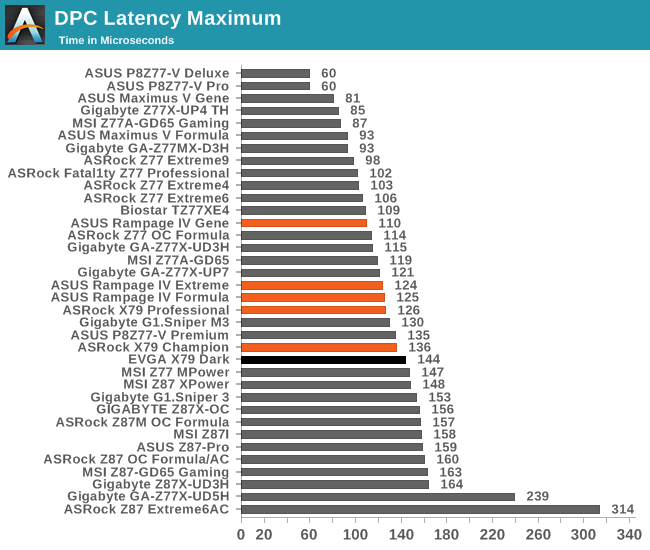
With Z87’s reluctance to have a peak DPC Latency less than 150 microseconds, it falls on Ivy Bridge to be the backup. The EVGA falls just under that 150 target.










23 Comments
View All Comments
JellyRoll - Thursday, October 24, 2013 - link
They lost Shamino :) They should have never let him go.Gen-An - Thursday, October 24, 2013 - link
Yep. Mr. Peter Tan was the reason why the X58 EVGA boards were so good, but once Asus got him, it was all over.DarkStryke - Friday, October 25, 2013 - link
They lost almost the entire motherboard engineering team to Sapphire like two years ago, and Shamino / Tan moved to ASUS. Their boards have been mediocre since, living off the hype fumes of the X58 glory days when they were one of the best boards out there.fluxtatic - Friday, October 25, 2013 - link
Interesting, as I was sort of under the impression that Sapphire had bailed back out of the motherboard market again a while back. I picked up a Sapphire Pure E-350 a couple years ago, as it was the right combination of price and features (even though documentation and support were fairly awful.) It's been a solid board, running my home file server. Last I looked, though, there were no Sapphire boards to be found. Maybe they just bailed on the US market?jasonelmore - Friday, October 25, 2013 - link
sapphire still makes AMD Graphics cards, and i'm sure they were recruited for them and not their motherboards lol.itchyartist - Wednesday, October 23, 2013 - link
good look for this motherboardpowruser - Thursday, October 24, 2013 - link
Crazy that they're asking $400 for this board. No ALC1150? ... Really? It's not like X79 is a brand new chipset, they've had plenty of time to figure out how to make a proper motherboard. Disappointing to say the least.defiler99 - Thursday, October 24, 2013 - link
I bought one of these and had nothing but trouble with it, despite using three different sets of RAM, etc, etc. I came to the conclusion that the board just wasn't ready to go, and got an ASUS X79-DELUXE instead. So far, working 1000% better.P4spooky - Friday, October 25, 2013 - link
Not to mention $50 cheaper! Shame the hardware looks impressive but don't have time to mess around with buggy bios issues.jasonelmore - Friday, October 25, 2013 - link
i dropped EVGA a couple of years ago and went to Asus simply because of their Custom PCB Video cards, and awesome motherboards.. EVGA was great, but they lacked a lot of custom and high performance components. All of their graphics cards were basicly a refrence design with a evga sticker.Here recently, they've heard the outcry and started making custom coolers, and maybe 1 or 2 custom pcb cards, but their engineering department pales in comparison to Asus's.
EVGA does win in the warranty and customer service departments. I loved that about evga, however i would have to rma my cards about once a year due to failing components. Now since i've went to custom pcb cards with better cooling and better parts, i haven't had to RMA once.. And if i ever have to RMA with Asus, i dread it, because they're customer support is awful.